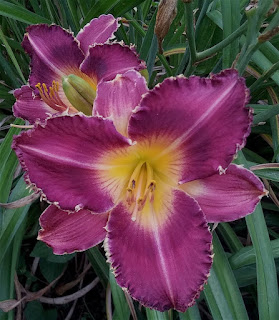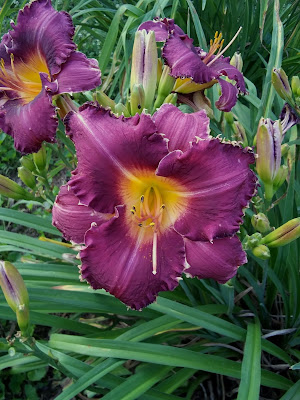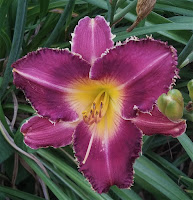Cultivar Name: Elizabethan Sharp Wit
Seedling Number: NBOMIB 15
Bloom Diameter: 5”
Scape Height: 40”
Branches: 4
Bud Count: 18
Bloom Season: MID
Rebloom: Yes
Color/Description: Grape purple petals with darker purple eye and edge, fine white teeth on petal edges and white midribs, dark purple eye radiating into the orange to cream throat.
Ploidy: TET
Bloom Habit: Diurnal
Foliage: SEV
Fragrance: UNK
Pod Parent: No Blue Oxfords
Pollen Parent: Men In Black
Year Bred: 2014
Rust Resistance: A+/2 years
Fertile: Fertile both ways
For a complete list of my available daylilies and pricing, click here.
Comments: Elizabethan Sharp Wit came from a cross that was simply meant to create purple colored flowers with improved rust resistance. When I began my breeding program in 2011, rust resistant purple tetraploids were scarce as hen's teeth, with only the Super Purple/Grand Masterpiece family such as Bela Lugosi and Nosferatu, descending from those tetraploid conversions, offering any reserves of rust resistance and purple coloring (in that instance very dark, near black purple). Later I would find Men In Black, and some of its relatives descending from Fortune's Dearest, though, again, these were all in the very intensely pigments version of purple. So one of my main goals during my rust screening was to find, and from them produce more, plants with high rust resistance in colors such as purple, lavender, pink and near-white - all hard to find with rust resistance at the tet level.
The specific cross that produced Elizabethan Sharp Wit was done to combine better cold hardiness and dormancy with rust resistance and some semblance of nice purple coloring. I didn't expect much. I would have been happy with one really strong, very rust resistant plant with dormancy and even purplish/mauve coloring. Many of the seedlings far exceeded my expectation, but most of the group tended to show poor thrips resistance, as both parents show poor thrips resistance. The seedling that would go on to become Elizabethan Sharp Wit always stood out. First, while not immune to thrips, it showed better resistance than its siblings, plus it showed very high rust resistance, and on top of that, it had great grape-purple color and moderate teeth on most flowers. Add to that a tall scape with nice branching and bud count, and this seedling was a win-win that made the cross worthwhile.
In addition to the nice visual traits, the plant has also proven to be very cold hardy and is fertile both ways. I have produced some seedlings from it with larger teeth, and I get lots of gorgeous purples from it. While the foliage is semi-evergreen, in really severe winters it goes dormant, but emerges fairly quickly once the weather becomes warmer. It has never declined in fan count due to even our coldest Polar Vortex winters. As a midseason bloomer, it tends to avoid some of the problems seen in the early plants with flower damage due to late freezes. The scapes average around 40", but the extremely cold spring of 2023 saw the scapes shorter, due to unusually late damage our plants received from having been growing for a couple of months when they got hit with those extremely late, hard freezes. In 2023 the scapes were more in the range of 28"-32", but that is the only time I have seen them that short. As with all purples, I rarely get a shot that is exactly how it looks in person, with day photos too reddish and evening photos too bluish. Some of the late afternoon photos below come very close to the actual color of the flower in person. I think that Elizabethan Sharp Wit will be an excellent cultivar for growers and hybridizers in warm-winter areas with endemic rust and has much to offer in such breeding programs, while also having much to offer to cold-winter programs as well, owing to the very cold-hardy pod parent, No Blue Oxfords by Richard Norris.










